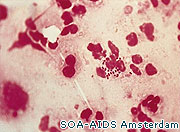Sexually transmitted infections (STIs) are on the up, official statistics show, with experts blaming reckless men and women in their early 20s and men who have sex with men.
A separate report says that 70 per cent of single women regularly have unprotected sex, and 18 per cent are often too drunk to use contraception.
The Health Protection Agency (HPA), which was behind the STI figures, warned “too many people are putting themselves at risk of STIs and serious health problems by having unsafe sex”.
Rise
There were 426,867 new cases of sexually transmitted infections diagnosed last year in England – up from 419,773 the previous year.
The overall rise was mainly driven by new diagnoses for gonorrhoea, which were up by 25 per cent on 2010, as well as syphilis and genital herpes.
The largest rise in diagnoses of STIs was seen in men who have sex with men, while amongst hetreosexuals overall rates remained highest in those aged 15-24.
There was also a warning that in the future gonorrhoea may become “untreatable” because resistance to treatment has grown.
Drunk
A separate survey of women’s attitudes to sex found the average single woman has had unprotected sex eleven times with a total of four different men.
The poll, of 2,000 women for an online pharmacy, also found eighteen per cent of single women are often too drunk to use contraception.
Commenting on the Health Protection Agency’s STI figures, Dr Gwenda Hughes, head of STI surveillance at the HPA, said they “are a matter of concern regarding young heterosexuals and men who have sex with men”.
Danger
She continued: “We anticipated some increase in diagnoses due to improvements in testing in recent years, but not on the scale seen here.”
Dr Hughes said: “People should consider reducing the number of partners they have and reduce overlap in their sexual partnerships.”
She also raised concerns about a “very real danger” of “untreatable gonorrhoea” in the future as recent testing had shown a “large increase in the amount of resistance” to the main drugs used to treat the infection.

